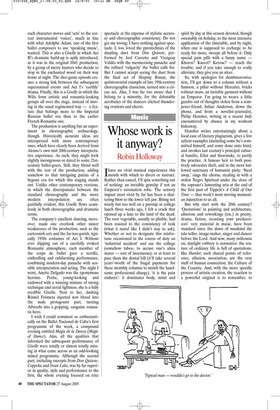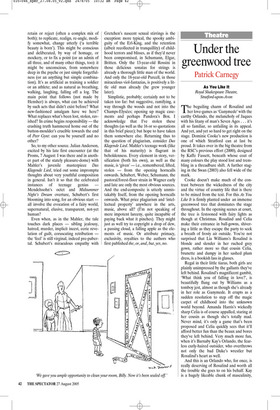Whose work is it anyway?
Robin Holloway
Ihave no vivid musical experiences this month with which to divert or instruct. Rather than cancel, I’ll spin something out of nothing: an invisible gymslip if not an Emperor’s coronation robe. The sensory impact most vivid by far has been a shattering blow to the lower left jaw. Biting not wisely but too well on a parsnip at college lunch three weeks ago, I felt a crack that opened up a lane to the land of the dead. The root vegetable, usually so pliable, had been roasted to the consistency of teak (what it tasted like I didn’t stay to ask). Whether or not to designate this misfortune occasioned in the course of duty an ‘industrial accident’ and sue the college (somehow taboo, to accuse one’s alma mater — sort of incestuous); or at least to pass them the dental bill (it’ll take several years’-worth of the frugal payments for these monthly columns to match the handsome professional charge), ‘it is the pain endures’: it dominates body, mind and spirit by day at this season devoted, though ostensibly on holiday, to the most intensive application of the timetable, and by night, when one is supposed to recharge to be ready for more, sweeps all before it. Only special pain pills with a funny name Khoros? Kareol? Keroac? — reach the trouble; and if you take enough to really alleviate, they give you an ulcer.
So, with apologies for dumbmoronisation, I’ll get down to a column without a Samson, a pillar without Hercules, bricks without straw, an invisible garment without an Emperor. I’m going to weave a little gazebo out of thoughts stolen from a composer-friend, Julian Anderson, down the phone, and from a novelist–journalist, Philip Hensher, writing in a recent Indy encountered by chance in my workout hideaway.
Hensher writes entertainingly about a local case of literary plagiarism, gives a few salient examples (including some he’s committed himself, and some done unto him); and invokes last century’s principal cultural bandits, Eliot and Stravinsky, to justify the practice. A famous heir to both positively advocates theft, and in the most hallowed sanctuary of humanist piety: ‘Steal away,’ sings the chorus, stealing in with a stolen Negro Spiritual under the close of the soprano’s lamenting aria at the end of the first part of Tippett’s A Child of Our Time — that work’s most moving moment: an injunction to us all.
But why start with the 20th century? ‘Quotations’ in painting and architecture, allusions and reworkings (etc.) in poetry, drama, fiction, recasting your predecessors’ very material in music, have been standard since the dawn of mankind the tale-teller, image-maker, singer and dancer before the Lord. And now, many millennia on, daylight robbery is normative: the texture of ordinary life is full of quotations, like Hamlet; such shared points of reference, allusion, association, are the very stuff of human connection; the Culture of the Country. And, with the more specific process of artistic creation, the reaction to a powerful original is to remember, to retain or reject (often a complex mix of both); to replicate, realign, re-angle, modify somewhat, change utterly (‘a terrible beauty is born’). This might be conscious and deliberated, by way of homage, or mockery, or to fix a point (or an admix of all three, and of many other things, too): it might be unconscious, from somewhere deep in the psyche or just simple forgetfulness (or an anything but simple combination). It’s as artificial as training a soldier or an athlete; and as natural as breathing, walking, laughing, falling off a log. The main point that follows (not made by Hensher) is always, what can be achieved by such acts that didn’t exist before? What new-fashioned amalgam have we here? What replaces what’s been lost, stolen, ravished? In crime begins responsibility — the crashing truth hammered home out of the button-moulder’s crucible towards the end of Peer Gynt: can you be yourself and no other?
So, to my other source. Julian Anderson, excited by his late first encounter (at the Proms, 7 August: I was there and in another part of the stately pleasure-dome) with Mahler’s juvenile masterpiece Das Klagende Lied, tried out some impromptu thoughts about very youthful composition in general. Isn’t it so that the celebrated instances of teenage genius — Mendelssohn’s octet and Midsummer Night’s Dream overture, Schubert’s first blooming into song, for an obvious start all involve the evocation of a fairy world, supernatural, elusive, transparent, not-yet human?
Even when, as in the Mahler, the tale touches dark places — sibling jealousy, hatred, murder, implicit incest, eerie revelation of guilt, coruscating retribution the ‘feel’ is still virginal, indeed pre-pubertal. Schubert’s miraculous empathy with Gretchen’s nascent sexual stirrings is the exception: more typical, the spooky ambiguity of the Erl-King, and the retention (albeit recollected in tranquillity) of childhood terrors and blisses, as if they’d never been compromised, in Schumann, Elgar, Britten. Only the 13-year-old Rossini in those delicious sonatas for strings is already a thorough little man of the world. And only the 18-year-old Purcell, in those miraculous viol-fantazias, is positively a little old man already (he grew younger later).
Simplistic, probably; certainly not to be taken too far: but suggestive, ramifying, a way through the woods and not into the Champs-Elysées; opening up magic casements and perhaps Pandora’s Box. I acknowledge that I’ve stolen these thoughts (as well as the 16 or so quotations in this brief piece); but hope to have taken them somewhere else. Returning thus to the question of plagiarism, consider Das Klagende Lied. Mahler’s teenage work (like that of his maturity) is flagrant in beholdenness. Every element in story, versification (both his own), as well as the music, is ‘given’ — i.e., remembered, lifted, stolen — from the opening horncalls onwards. Schubert, Weber, Schumann, the pastoral/forest-floor strain in Wagner early and late are only the most obvious sources. And the end-composite is utterly unmistakably Itself, from the opening horncalls onwards. What price plagiarism and ‘intellectual property’ anywhere in the arts, music, above all? (I’m not speaking of mere impotent larceny, quite incapable of paying back what it pinches). They might just as well try to copyright a drop of dew, a passing cloud, a falling apple as the elements of music. Or attribute primacy, exclusivity, royalties to the authors who first published the, or, and, but, yes, no.












































 Previous page
Previous page